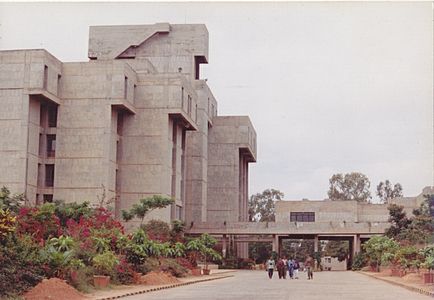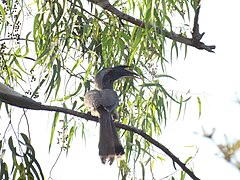Gandhi Krishi Vigyana Kendra
 | |
| Type | Public research university |
|---|---|
| Location | , , 560065 , India |
| Campus | Urban, 412 acres (167 ha) |
| Website | www |
Gandhi Krishi Vigyana Kendra (GKVK), is one of the campus and administrative headquarters of UAS (University of Agricultural Sciences, Bangalore). It is located in Bengaluru Suburb Yelahanka, Karnataka, India.[1]
History
[edit]
Maharani Kempa Nanjammanni Vani Vilasa Sannidhi, the Regent of Mysore, donated 30 acres of land in 1899 for the Experimental Agricultural Station at Hebbal. Dr. Lehmann, a German Scientist, initiated research on soil crop response. In 1906, Dr. Leslie Coleman, a Canadian Entomologist and Mycologist, succeeded Dr. Lehmann.
The station expanded to 202 acres, aided by M. Vishveshwaraiah, who established the Mysore Agriculture Residential School in 1913. In 1946, Mr. M.A. Srinivasan, Minister of Agriculture, founded Agriculture College, Hebbal, offering a four-year program affiliated with the University of Mysore.
In 1963, the University of Agricultural Sciences (UAS) was established, with 1300 acres granted for the Gandhi Krishi Vigyana Kendra Campus. Dr. K.C. Naik became the first Vice Chancellor in 1964. In 1969, Indira Gandhi inaugurated the GKVK campus. Veterinary College, Hebbal, was established in 1958.
On October 1, 1965, UAS Bangalore absorbed various agricultural colleges and research stations. It expanded its offerings, establishing the Fisheries College at Mangaluru in 1969 and the Agricultural Engineering Institute at Raichur. In 1974, Home Science College was founded at the Dharwad campus, alongside other colleges.[2]
Campus
[edit]-
Library
-
In 2006
-
Bust of M Puttarudriah
-
Heritage Site Map
The campus comprises 412 acres of land.[3] The campus was declared as a biodiversity heritage site in 2010 by the Karnataka Biodiveristy Board.[3][4] The university has engaged in development of various agro and biotech research plots, as well as nurturing its landscape to support a diverse range of flora and fauna. Its campus is said to be known for its efforts towards environmental sustainability, being considered as one of the greenest areas in Bengaluru. In addition to its research endeavors, the university has facilitated the collection of a wide array of germplasms and has established a botanical garden boasting nearly 600 species of important plants. Furthermore, the university has implemented herbal gardens and conducted research on agriculturally significant microbes, among other initiatives.[3] In 2023, About 1000 eucalyptus trees were axed as it was decided to replace them with 10,000 native species of trees.[5] Victoria amazonica is also present in the campus and is grown to distribute to various other institutions among the country.[6] GPS-enabled smart bicycles for students and staff of the University are available in the campus.[7]
Fauna Biodiversity
[edit]The campus has about 13 species of mammals, ten species of reptiles, 165 species of birds and over 500 species of plants according to an survey.[8] eBird lists around 171 species of birds seen in the campus.[9]
-
Swinhoe's minivet from the gardens of the campus.
-
Indian Peacock on top of a flowerbush within the campus.
-
Indian Grey Hornbill from the campus.
-
Spotted Owlet from the campus.
Krishi Mela
[edit]Krishi Mela[10] is an annual event (fair) in the campus.[11] It showcases latest agricultural technologies for the benefit of farmers. The event includes stalls from various research institutes, seeds companies, farm machinery manufacturers in India as well as stalls showcasing techniques of organic farming and produces.[10] In 2022, 1.7 million people visited the fair, and over 95 million transactions were conducted.[12]
External links
[edit]References
[edit]- ^ https://www.karnataka.gov.in/kbb/english/Pages/Gandhi-Krushi-Vignana-Kendra-(GKVK).aspx Gandhi Krishi Vigyana Kendra as shown on Karnataka government website
- ^ "History". uasbangalore.edu.in. Retrieved 15 April 2024.
- ^ a b c "Brief details of Gandhi Krishi Vignyan Kendra Biodiversity Heritage Site, Karnataka" (PDF). Karnataka Biodiversity Board.
- ^ "GKVK a 'biodiversity heritage'". The New Indian Express. 16 May 2012. Retrieved 15 April 2024.
- ^ DHNS. "Bengaluru's Gandhi Krishi Vigyan Kendra to replace eucalyptus with native trees". Deccan Herald. Retrieved 15 April 2024.
- ^ Mavad,DHNS, Asra. "World's largest water lily species blooms in Bengaluru". Deccan Herald. Retrieved 15 April 2024.
- ^ "Bengaluru: Smart rental bikes help GKVK campus go green; GPS-enabled bicycles work with app, cost Rs 5 an hour". Bangalore Mirror. 28 November 2017. Retrieved 15 April 2024.
- ^ DHNS. "Heritage tag may save GKVK from land sharks". Deccan Herald. Retrieved 15 April 2024.
- ^ "GKVK Campus--Botanical Garden, Bengaluru Urban County, KA, IN - eBird Hotspot". ebird.org. Retrieved 15 April 2024.
- ^ a b DHNS. "'Krishi Mela' at GKVK campus from Nov 16". Deccan Herald. Retrieved 15 April 2024.
- ^ "UAS-Bangalore Krishi Mela from Nov 19-21". BusinessLine. 9 October 2014. Retrieved 15 April 2024.
- ^ Service, Express News (16 November 2023). "Four-day Krishi Mela to kick off on Friday". The New Indian Express. Retrieved 15 April 2024.








